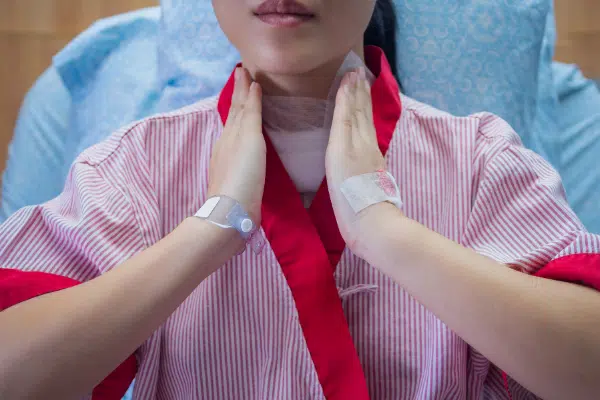It takes about 6-12 weeks* to fully recover from thyroid surgery, however depending on the extent of surgery type and your health condition, most patients in our hands are ready to resume normal activities in 1 to 2 weeks.
With more than 20 million Americans suffering from some form of thyroid disease, thyroid surgeries are common. The key to a successful procedure and quick recovery is finding an experienced thyroid surgeon and following your doctor’s recommendations closely.
Arranging a Comfortable Recovery Period
The length of your recovery period heavily depends on how well you prepare for it. Consider taking these steps to make your recovery faster and more comfortable.
1. Ask for Help
You need to ask someone to drive you home after the surgery. You shouldn’t get behind the wheel for at least 48 hours after general anesthesia.
Ask a friend or a family member to stay with you for 24 hours after you get home. If it’s not possible, ask someone to be on call in case you need assistance.
2. Prepare Medicine, Food, and Beverage
After you come home, you may not want to go outside for a day or two. Make sure you have everything you need to feel comfortable. This includes stocking up on healthy and easy-to-prepare food. You may want to eat soft foods until the soreness and stiffness in your throat subside.
Fill your prescriptions in advance. Ask your doctor which medications you’ll need after the surgery and make sure you have them ready.
3. Arrange Pet and Childcare
For a few days after the surgery, you should limit strenuous activities. Consider arranging child and pet care if possible.
4. Stop Smoking
If you are a smoker, you need to stop smoking weeks before the surgery. Otherwise, you may encounter breathing problems during and after the surgery and risk developing pneumonia.
Smoking affects your blood flow, which could lead to problems with healing. It also puts you at a higher risk of infection.
Quitting smoking even one day before the surgery can lower your risk of complications. However, kicking the habit four weeks in advance can improve health outcomes by 19%.
5. Switch to a Healthy Diet
Just like any invasive procedure, thyroid surgery is a stress for your body. To help it recover quickly, consider switching to a healthy diet a couple of weeks before the surgery. This can speed up your recovery period.
However, you shouldn’t make any drastic changes to your diet right before the surgery. This could lead to health problems.
What to Expect During the Recovery Period
Generally, the recovery period after thyroid surgery isn’t long. By learning as much as you can about it, you can avoid complications and even speed up the process.
- Your doctor will set up a follow-up appointment and give you a full set of recommendations about the recovery period before you leave the clinic.
- You may have a temporarily sore throat, neck pain, difficulty swallowing, and a hoarse voice.
- The pain at the site of the incision can remain for about 7 days. Your doctor will prescribe painkillers if necessary.
- For a few days, your neck may feel swollen, hard, and numb.
- You may experience stiffness in your neck for several weeks. Try to avoid driving or exercising before the stiffness is gone.
If you have any questions about the recovery period, ask them before the surgery. You may have trouble speaking (a weak voice) right after the surgery.
What NOT to Do When Recovering from Thyroid Surgery
- Lift heavy items for at least two weeks after the surgery. Physical stress can raise blood pressure, which in turn could force the cut open and cause bleeding. Try not to lift anything heavier than 10 pounds (a filled large garbage bag).
- Shower right after surgery. You should wait 48 hours after the thyroid surgery before taking a shower. Soaking or rubbing the incision site can keep it from healing properly.
- Smoke during the recovery period. Smoking affects your immune system, keeps your body from healing properly, and makes it more susceptible to infection.
- Drink alcohol while taking painkillers. Mixing alcohol with painkillers can be dangerous for your health. If you aren’t taking painkillers, avoid alcohol for at least 24 hours after the surgery.
By refraining from these activities, you can avoid increasing the recovery time.
FAQ About Recovery from Thyroid Surgery
Q: When can I get back to work after thyroid surgery?
A: Many people return to work 1 week after the surgery. However, if your work involves strenuous activities, consider taking at least 2-3 weeks off.
Q: When can I drive after thyroid surgery?
A: Don’t drive for at least 48 hours after the surgery to allow the anesthesia to wear off completely. Since your neck will feel stiff for several days, you could have trouble turning your head while driving. Some medications you may take to ease the pain could make you drowsy. You can resume driving once your neck feels normal, and you stop taking painkillers.
Q: When can I exercise after thyroid surgery?
A: Generally, you can start exercising 2 weeks after the surgery. However, it’s best to avoid contact sports for a couple of months. Consult your doctor before starting strenuous exercises.
Q: When can I go outside after thyroid surgery?
A: You can start taking outdoor walks 24 hours after the surgery as long as you don’t feel dizzy. Consider asking someone to walk with you.
Speeding Up Your Recovery from Thyroid Surgery
While many factors affect the duration of your recovery, you can start returning to normal activities in just a few days after the surgery. For some patients, full recovery may take up to 6-12 weeks.
C/V ENT Surgical Group performs a variety of thyroid surgeries including minimally invasive procedures. If you’d like to learn more about the procedure or schedule an appointment, please contact us today.


